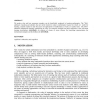Free Online Productivity Tools
i2Speak
i2Symbol
i2OCR
iTex2Img
iWeb2Print
iWeb2Shot
i2Type
iPdf2Split
iPdf2Merge
i2Bopomofo
i2Arabic
i2Style
i2Image
i2PDF
iLatex2Rtf
Sci2ools
108
click to vote
IADIS
2004
2004
Erroneous Examples as a Source of Learning in Mathematics
We analyze why and how erroneous examples can be beneficially employed in learning mathematics. The `Why' addresses reasoning and attitudes that are rarely fostered in today's mathematics lessons but which are useful for learning, certainly needed in real life and in all applications of mathematics as well as in maths itself. The `How' addresses pedagogical strategies capitalizing on errors via erroneous examples and their realization in the web-based learning environment ActiveMath. An analysis of classes of errors informs the knowledge representation, the instructional strategies and the feedback of ActiveMath. KEYWORDS cognition in education, meta-cognition
Erroneous Examples | IADIS 2004 | IADIS 2008 | Today's Mathematics Lessons | Web-based Learning Environment |
Related Content
| Added | 31 Oct 2010 |
| Updated | 31 Oct 2010 |
| Type | Conference |
| Year | 2004 |
| Where | IADIS |
| Authors | Erica Melis |
Comments (0)

